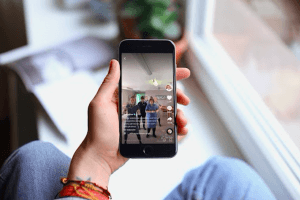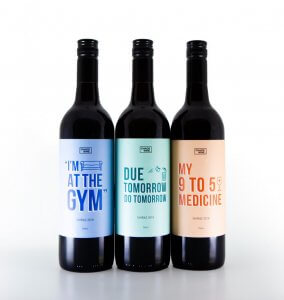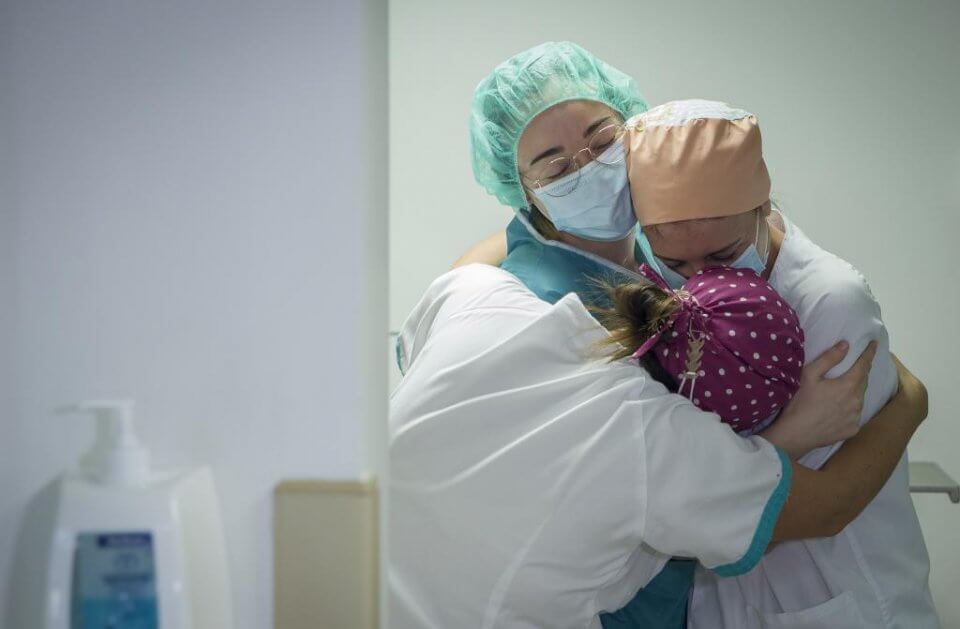In April 2020, almost two months into an unprecedented global lockdown triggered by the Covid-19 pandemic, a TikTok video showing British National Health Service (NHS) workers in their workplaces dancing to Shakira’s 2010 hit Waka Waka went viral. ‘You’re a good soldier,’ the Colombian singer assures, as a beautiful blonde woman with full make-up points into the camera. ‘Choosing your battles’ – another woman, sitting at the wheel of a police vehicle, playfully punches the air. She is wearing a full uniform, the radio and bullet-proof vest visible in the frame.
As Shakira continues with her war metaphors, exacerbated with mention of the public’s attention – ‘You’re on the front line, everyone’s watching / You know it’s serious, we’re getting closer / This isn’t over’ – more and more women fill the screen. They smile, they dance, they throw fists in the air. They are wearing their work clothes: scrubs and face masks in the case of some, very cadet-looking, belted and dark-green NHS uniforms in the case of the others. They wear their hair long and their cheeks shiny with highlighter. They are women doing their work.
The 15-second span of this video is mesmerizing: this song is an absolute battle cry, an adrenaline-soaked hurray! with a slogan hand-crafted to lift up, encourage, make a tired person gather just that much more strength. And as you watch it, you feel some sort of a strange disconnect between the gritty poetics of the ‘push through your pain to victory’ lyrics and the beautiful smiling female faces looking at you. The frontline heroes.

The video, in fact, is quite accurate in terms of representation: according to United Nations data, 70% of the healthcare workers on the Covid-19 frontline were women. And the short meme Shakira-voiced video, while not intended as serious research or an essay on the state of humanity, highlighted an important shift. The song, full of wartime parallels and producer-honed battle-cries, was written for the Football World Cup – and the only reason it talks about ‘soldiers’, ‘battles’ and ‘frontlines’ is because it is about men. Men who gathered to fight for a ball, but men nonetheless, and all the metaphors about power, strength and endurance came into play. Here we are dealing with archetypes, and that of a soldier, defender or warrior who fights on the frontline to save others is traditionally a male archetype.
Except not this time; arguably, the words ‘You’re on the front line, everyone’s watching / You know it’s serious, we’re getting closer / This isn’t over’ were far more appropriate when talking about stopping the Covid-19 pandemic, than when deciding which football team is best at football. And this time the frontline soldiers, the fighters, the saviours and the heroes have female faces. So maybe this pandemic, while in short-term pulling women back, is pushing forward a bigger change, an archetypal change? The battles of the new era are not fought in cold fields with swords, they are fought with knowledge, compassion and stamina in hospitals and laboratories. And the heroic defenders are women.
What legacy might the 2020 pandemic leave behind? A short paper, Sensing And Shaping The Post-COVID Era, prepared by the BCG Henderson Institute suggests that it might be a shift towards the digital world and online commerce. There is the potential of growth for e-commerce and home-available entertainment, as well as food delivery and home cooking. These sectors curiously align quite well with the currently female-dominated areas – health, recruitment, education and customer service.
The big question now is the move online – and have women, so far, been up to the task?

E-commerce and Network-Building
‘Under lockdown, the most cooperation and joint initiatives I’ve seen came from women,’ says Nika Shevela, a sommelier and founder of a Barcelona-based wine events company, Wine Alphabet. ‘I obviously don’t want to generalise and say “oh, all men were so aggressive and competitive!” Some male professionals did a lot throughout the lockdown. But I felt some competitiveness from men, while I just didn’t see any of that between women. There was more empathy, you know. And communication. Female-led businesses did not just post “We do wine delivery!” They took care to make it diverse (audio, visual, verbal) and fun.’
Spain announced a nationwide strict lockdown on 14 March. ‘Spring is the busiest time of the year for events. Private tastings, public tastings, different collaborations – everything was set for March, April and May,’ recalls Nika. I am talking with her in mid-June, when the lockdown months are but a scary memory of the past. Having survived the impact of the pandemic, Nika speaks about it with a sardonic smile. But make no mistake – the abrupt cancellation of all her plans was a shock, as before the lockdown 90% of her business relied on face-to-face events and communication. However, falling back and doing nothing just wasn’t an option.
Nika adapted. ‘By April I launched my first paid online content,’ she says. ‘I offered an online wine-tasting course called Sipping Spain. And that worked really well! I’ve managed to grow my financial turnover for a single event. For my in-person tastings, the capacity is 10 to 20 people. With online courses, my limit is 50. I never had 50 yet, but I had over 20 people who purchased a ticket to the same tasting.’
That was Nika’s first quarantine business achievement. The second one was networking – in lockdown she launched Wine Online, a series of Instagram Live conversations where she brought in dozens of women from all over the world to talk and share their expertise. A daughter of an old wine dynasty in Tuscany, a Georgian winemaker, a Catalan sommelier living in New York – bright female faces and vibrant accents painted her Instagram Live feed during the lockdown.

Why was Nika inviting women specifically? ‘When I got into the wine industry, I realised that I was treated differently,’ she explains. ‘Being a woman certainly brought out a certain attitude; it was never overt sexism, but, you know, [I got] plenty of stupid questions. “Do you know what this device is?” And I am like, yeah, I am a professional sommelier. I know what this device is. Even though I’m a blonde woman. How shocking!’ she remarks. Incidents like these inspired her to start building a network of women in wine, and in quarantine she gave it an international spin.
Right now Nika feels enthusiastic about the new Wine Alphabet 2.0. She continues with her own online courses, teaches in a wine school, offers wine consultancy online, and is eager to experiment further. Quite recently, for example, she came up with a format where when purchasing a wine-tasting course, you can add a full box of wine, aligned with the tasting. One click – and your specially selected wine arrives at your house, with a sommelier later zooming in to tell you about what you are drinking and help find those raspberry and green pepper notes. ‘I’m definitely transitioning to a hybrid model. I have to yet figure out the percentages, but I would not be surprised If online continued to be at least fifty percent of my business in 2021 and further on,’ she says.

Global change and archetype shift
While the most immediate and obvious effects of the Covid-19 crisis are going to be negative – businesses with a substantial female workforce taking the hard ‘social distancing’ blow, women taking on the bulk of childcare and household labour and sacrificing their paid work time – a more important cultural and philosophical shift might be underway, researchers suggest. A paper, published by the National Bureau of Economic Research, posits the long-term question – how will the pandemic change our society?
This crisis, they argue, is unparalleled in modern history as it forces people to stay home. And this is likely to lead to a fundamental societal change: ‘The mere fact of being at home rather than at a workplace is likely to increase men’s childcare responsibilities. Even if on average women will shoulder the majority of the increase, many fathers will still experience a large increase in their childcare hours.’
Such was the experience of Anton, whose Barcelona-based IT company moved to 100% remote work: ‘I can’t even list all of the little discoveries I made about my daughter Vasilissa and about fatherhood during the lockdown. I hear everything she says, every new word she learns, watch her facial expressions, how she learns to get what she wants, how her and my wife interact … I honestly couldn’t even imagine how much I’d missed working from the office, how many things I never saw and never was a part of!’ he says. ‘Me and Vasilissa have become much closer during this quarantine, she understands me better and is much more eager now to spend time together, just the two of us. Sometimes she suddenly turns to me, looks into my eyes, says “Papa, I love you!” and gives me a hug. Honestly, the only thing I regret is that I didn’t used to be at home more before.’
Cooperation on the frontline
Isabel Mazarico Altisent, an endocrinologist in Sabadell, Catalonia, keeps her skepticism about the ‘shift change’. She says she would love it if it occurred, but that right now women in medicine still face a lot of obstacles and have to fight for respect and good pay.
She does, however, say that the pandemic months were special. Yes, she and her colleagues had to work inhumanely long hours – but she felt the importance of what she does stronger than ever: ‘I have felt my social and humanitarian responsibility much more intensely these months. When they called us to go work with the Covid patients, I thought that it was my duty and I really wanted to be there, to help.’
When Seville moved the last Covid-19 patient from the intensive care unit to a regular patient’s room in Spring 2020, an impactful photo was released. A photographer from Europa Press, María José López, pictured this moment of victory in the Quironsalud Sagrado Corazón hospital: three women, in white coats, face masks and silly scrubs hats hug each other with intense emotion and relief. It is a picture of absolute victory and joy; there is a tiredness to the extreme, happiness, and – here is the word – sisterhood. The women depicted – we know it just by looking – have spent long hours, long days, weeks and months battling death. And they won. And they are happy. And they hug each other as a unit, as people who are family. I ask Isabel Mazarico Altisent – how does this picture make her feel?

‘I really, really like it. It makes me feel represented. I feel proud that I could help, with all the exhaustion and endless concerns for the patients’ lives that that involved. But apart from that, I felt extremely happy with the cooperation that emerged between all of our hospital’s employees. In these months it didn’t matter whether you were a woman or a man, young or old, a nurse, a technician, a doctor, a cleaner, a mechanic. It didn’t matter in the least. Whatever the job position, we had been helping each other. There was a lot of cooperation and companionship. And to me, that was the most positive thing about the Covid era – to see people cooperating as equals in a united goal.’
Isabel’s description finally puts the pieces into place: during quarantine and under pressure, that was the one thing women of business, of leadership and medicine, absolutely excelled at – cooperation.
Extending helping hands, supporting each other’s initiatives, and hugging each other in an exhausted win. The changes – more equal partnership in parenthood, the ‘saviour and defender’ archetype shifting to become more compassionate and female, more women starting future-forward businesses – these changes might be slow to come or never come at all. But if our modern global world needs something right now, facing the global threat of severe climate change and more crises like the pandemic, it is cooperation. And women, as we learned, are good at that.
Daria Gavrilova teaches Business English at Geneva Business School in Barcelona. She also works as a journalist and translator. Daria is Russian radio Kommersant FM’s own correspondent in Spain. She recently published her first book, ‘What is Barcelona? Beaches. Independence. Jamón’, the first book about Barcelona in Russian.
If you’d like to contribute to our Opinion section, please email us: editorial@spainenglish.com. We’d love to hear from you.


